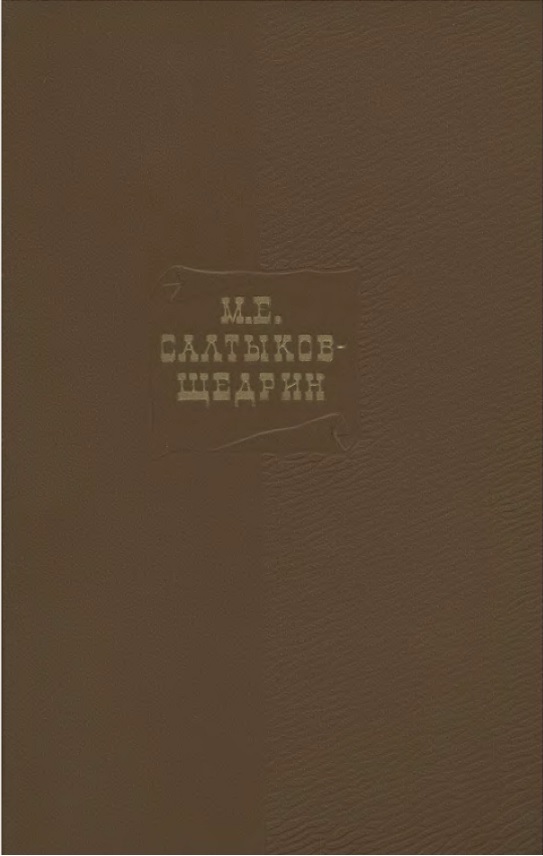
Part of Series
В состав четвертого тома входят произведения, относящиеся ко второй половине 50-х — началу 60-х годов. Одни из них («Жених», «Смерть Пазухина», «Два отрывка из "Книги об умирающих"», «Яшенька», «Характеры») были опубликованы в журналах, но в сборники Салтыковым не включались и не переиздавались. Другие по разным причинам и вовсе не появились в печати при жизни автора («Глупов и глуповцы», «Глуповское распутство», «Каплуны», «Тихое пристанище», «Тени»). Цензурные преследования или угроза запрета сыграли далеко не последнюю роль в судьбе некоторых из них. По времени написания, по общему кругу тем и персонажей «Жених», «Смерть Пазухина», «Яшенька» и «Два отрывка» примыкают к первому циклу писателя («Губернские очерки»). Вместе с тем три последних произведения предназначались, по-видимому, уже для новой, задуманной Салтыковым «Книги об умирающих», которая так и не была создана. Не слились в цикл также и произведения «глуповской» серии. Разные по темам и проблематике, по жанру (сатирические очерки, рассказы, фельетоны, повести, драматические сатиры-комедии), наконец, по художественному уровню, произведения настоящего тома не лишены все же определенного единства. Они отражают идейно-политическое и художественное развитие Салтыкова в один из самых сложных периодов его общественно-литературной биографии. В годы революционной ситуации, в пред- и пореформенную пору, в эту столь значительную и богатую событиями полосу исторической жизни России внимание писателя приковано к острейшим проблемам современности (положение народных масс и перспективы крестьянской революции, роль демократической интеллигенции в освободительном движении, стратегия и тактика борьбы с крепостничеством и реакцией, философское, конкретно-историческое обоснование социалистического идеала, образ передового общественного деятеля и т. д ). «Жгучий вопрос эпохи»: что делать человеку демократических и социалистических убеждений в то время, когда пропасть разделяет косную жизнь глуповской России и социалистический идеал будущего,— этот вопрос приобрел у Салтыкова, как, может быть, ни у какого другого художника, его современника, сугубо личное и сугубо практическое значение.
Authors

Mikhail Saltykov was born on 27 January 1826 in the village of Spas-Ugol (modern-day Taldomsky District of the Moscow Oblast of Russia) as one of the eight children (five brothers and three sisters) in the large Russian noble family of Yevgraf Vasilievich Saltykov (1776—1851) and Olga Mikhaylovna Saltykova (née Zabelina) (1801—1874). His father belonged to an ancient Saltykov noble house that originated as one of the branches of the Morozov boyar family. According to the Velvet Book, it was founded by Mikhail Ignatievich Morozov nicknamed Saltyk (from the Old Church Slavonic word "saltyk" meaning "one's own way/taste"), the son of Ignaty Mikhailovich Morozov and a great-grandson of the founder of the dynasty Ivan Semyonovich Moroz who lived during the 14-15th centuries. The Saltykov family also shared the Polish Sołtyk coat of arms. It gave birth to many important political figures throughout history, including the Tsaritsa of Russia Praskovia Saltykova and her daughter, the Empress of Russia Anna Ioannovna. Saltykov's mother was an heir to a rich Moscow merchant of the 1st level guild Mikhail Petrovich Zabelin whose ancestors belonged to the so-called trading peasants and who was granted hereditary nobility for his handsome donation to the army needs in 1812; his wife Marfa Ivanovna Zabelina also came from wealthy Moscow merchants. At the time of Mikhail Saltykov's birth, Yevgraf was fifty years old, while Olga was twenty five. Mikhail spent his early years on his parents' large estate in Spasskoye on the border of the Tver and Yaroslavl governorates, in the Poshekhonye region. "In my childhood and teenage years I witnessed serfdom at its worst. It saturated all strata of social life, not just the landlords and the enslaved masses, degrading all classes, privileged or otherwise, with its atmosphere of a total lack of rights, when fraud and trickery were the order of the day, and there was an all-pervading fear of being crushed and destroyed at any moment," he remembered, speaking through one of the characters of his later work Old Years in Poshekhonye. Life in the Saltykov family was equally difficult. Dominating the weak, religious father was despotic mother whose intimidating persona horrified the servants and her own children. This atmosphere was later recreated in Shchedrin's novel The Golovlyov Family, and the idea of "the devastating effect of legalized slavery upon the human psyche" would become one of the prominent motifs of his prose. Olga Mikhaylovna, though, was a woman of many talents; having perceived some in Mikhail, she treated him as her favourite. The Saltykovs often quarrelled; they gave their children neither love nor care and Mikhail, despite enjoying relative freedom in the house, remembered feeling lonely and neglected. Another thing Saltykov later regretted was his having been completely shut out from nature in his early years: the children lived in the main house and were rarely allowed to go out, knowing their "animals and birds only as boiled and fried." Characteristically, there were few descriptions of nature in the author's works.

